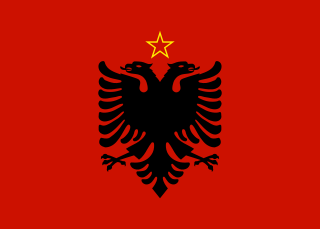 W
WAlbania, officially the People's Socialist Republic of Albania, was ruled by a Marxist-Leninist government from 1946 to 1992. From 1944 to 1946, it was known as the Democratic Government of Albania and from 1946 to 1976 it was known as the People's Republic of Albania.
 W
WThe Albanian People's Army was the national army of the People's Socialist Republic of Albania from 1946 to 1990. Like all other Communist states, the UPSh was subjected to the rule of the Party of Labour of Albania. It was dissolved in 1990 and retained its current form through the Albanian Armed Forces. It consisted of the Ground Forces, the Navy and the Air Force. The militia of the UPSh was the Voluntary Forces of Popular Self-Defense (FVVP), and affiliate military structures include the Armed School Youth (RSHA) and Civil Defense of the Republic (MCR).
 W
WRamiz Tafë Alia was an Albanian politician serving as the second and last leader of the People's Socialist Republic of Albania from 1985 to 1991, serving as First Secretary of the Party of Labour of Albania. He was also the country's head of state from 1982 to 1992. He had been designated as successor by Enver Hoxha and took power after Hoxha died.
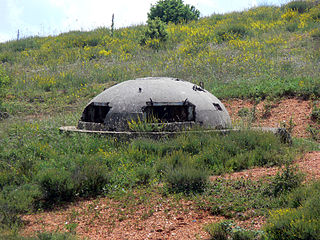 W
WConcrete military bunkers are a ubiquitous sight in Albania, with an average of 5.7 bunkers for every square kilometre. The bunkers were built during the Stalinist and anti-revisionist government of Enver Hoxha from the 1960s to the 1980s; by 1983 a total of 173,371 bunkers had been constructed around the country.
 W
WAdil Çarçani was an Albanian politician who served as the 24th Prime Minister of Albania during the Communist era led by Enver Hoxha. He served as the titular head of the Albanian government in the years immediately preceding the fall of Communism.
 W
WThe Constitution of the People's Socialist Republic of Albania was the constitution used in the People's Socialist Republic of Albania. The constitution, promulgated on 28 December 1976, established Albania as a "People's Socialist Republic". The constitution was based on the original 1946 constitution that established post-World War II Albania as a "People's Republic".
 W
WThe term enemy of the people or enemy of the nation, is a designation for the political or class opponents of the subgroup in power within a larger group. The term implies that by opposing the ruling subgroup, the "enemies" in question are acting against the larger group, for example against society as a whole. It is similar to the notion of "enemy of the state". The term originated in Roman times as Latin: hostis publicus, typically translated into English as the "public enemy". The term in its "enemy of the people" form has been used for centuries in literature.
The fall of Communism in Albania, the last such event in Europe outside the USSR, started in earnest in December 1990 with student demonstrations in the capital, Tirana, although protests had begun earlier that year in other cities such as Shkodra and Kavaja. The Central Committee of the communist Party of Labour of Albania allowed political pluralism on 11 December and the largest opposition party, the Democratic Party, was founded the next day. March 1991 elections left the Party of Labour in power, but a general strike and urban opposition led to the formation of a "stability government" that included non-communists. Albania's former communists were routed in elections in March 1992 amid economic collapse and social unrest, with the Democratic Party winning most seats and its party head, Sali Berisha, becoming president.
 W
WCommunist Albania maintained labour camps throughout the territories it controlled. The first Communist Albanian labour camps were around Tirana. A number of camps existed between 1946 and 1991 during the Cold War. During the rule of Stalinist dictator Enver Hoxha, the Sigurimi secret police imprisoned thousands in forced-labour camps.
 W
WEnver Halil Hoxha was an Albanian communist revolutionary and statesman who served as the First Secretary of the Party of Labour of Albania, from 1941 until his death in 1985. He was also a member of the Politburo of the Party of Labour of Albania, chairman of the Democratic Front of Albania, commander-in-chief of the armed forces from 1944 until his death. He served as the 22nd Prime Minister of Albania from 1944 to 1954 and at various times served as both foreign minister and defence minister of the People's Socialist Republic of Albania.
 W
WIslam in Albania (1945–1991) covers a period of time when the Albanian Labor Party came to power under Enver Hoxha and exercised almost total control over the Albanian people. The communist government sought to radically overhaul Albanian society by realigning social, cultural and religious loyalties to the communist party through Albanian Nationalism in the pursuit of achieving unitary Albanian identity.
 W
WThe Labour Youth Union of Albania was the youth organization of the Party of Labour of Albania. Founded on November 23, 1941 as the Communist Youth it was officially described as the "greatest revolutionary force of inexhaustible strength" and a "strong fighting reserve of the party" it was a key organization for political socialization in socialist Albania. It was affiliated with the Democratic Front.
 W
WHaxhi Lleshi was an Albanian military leader and communist politician who served as the Chairman of the Presidium of the People's Assembly of the People's Socialist Republic of Albania from 1953 to 1982.
 W
WBaba Faja Martaneshi was an Albanian Bektashi baba (Sufi) and a resistance leader during the National Liberation War of the Albanian People.
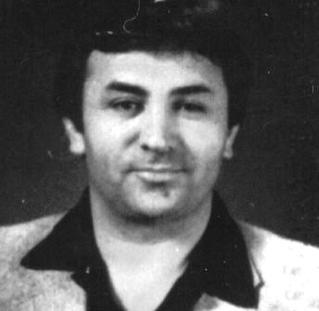 W
WMustafa Band was a group of four Albanian exiles who wanted to kill Enver Hoxha in 1982. The plan failed and two of its members were killed and one arrested.
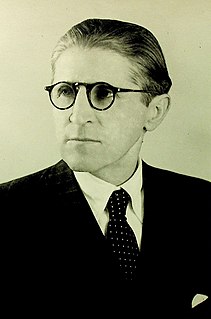 W
WOmer Nishani was an Albanian doctor and political figure involved first in the struggle against Ahmet Zogu in the 1920s and 1930s, and then in the struggle against the fascist occupation of Albania during the 1942–44 period, becoming Chairman of the Presidium of the People's Assembly of the People's Republic of Albania in 1946 and serving in this position until 1953.
 W
WOperation Valuable, also known as the Albanian subversion, was one of the earliest covert paramilitary operations in the Eastern Bloc. The main goal of the operation was to overthrow the government of communist Albania.
 W
WThe Party of Labour of Albania, sometimes referred to as the Albanian Workers' Party (AWP), was the vanguard party of Albania during the communist period (1945–1991) as well as the only legal political party. It was founded on 8 November 1941 as the Communist Party of Albania, but its name was changed in 1948. In 1991, the party was succeeded by the Socialist Party of Albania. For most of its existence, the party was dominated by its First Secretary, Enver Hoxha, who was also the de facto leader of Albania.
 W
WThe Pioneers of Enver was a pioneer movement functioning in Albania during its communist period. Formed as Debatik, an acronym for United Boys of Communist Ideas on 10 February 1942, the movement continued as Organization of Pioneers. After the Second World War, it was supervised by the Labour Youth Union of Albania, the youth wing of the Party of Labour of Albania.
 W
WPorto Palermo Tunnel is claimed to be a submarine bunker built in the Socialist People's Republic of Albania during the rule of leader Enver Hoxha. It is situated at the northern end of the bay of Porto Palermo. It is no longer in use as such, but remains in a military restriction zone. Almost certainly its main function was as a homebase for fast attack craft. Unlike submarines, these craft are short range coastal defence vessels that lie hidden during the day near to where they have to operate at night. Albanian Whiskey class submarines were long range vessels and were normally based further from Pashaliman Naval Base in the Bay of Vlore. Retired in 1998, submarines are still located in Pashaliman.
 W
WVasil Shanto, called Vasko was one of the founders of the Albanian Communist Party. He was the leader, along with Qemal Stafa, of the Shkodër communist group. One of the delegates of the party, he was frequently sent to meet with the Yugoslavian Communist Party.
 W
WMehmet Ismail Shehu was an Albanian communist politician who served as the 23rd Prime Minister of Albania from 1954 to 1981. As an acknowledged military tactician, without whose leadership the communist partisans may well have failed in their battle to win Albania for the Marxist-Leninist cause, Shehu exhibited an ideological understanding and work ethic that singled him out for rapid promotion in the communist party. Mehmet Shehu shared power with Enver Hoxha from the end of the Second World War. According to official Albanian government sources, he committed suicide on December 17, 1981, after which the entire Shehu clan were arrested and imprisoned while Mehmet Shehu himself was denounced as "one of the most dangerous traitors and enemies of his country". Persistent rumors remain, however, that Shehu was actually murdered on orders from Hoxha.
 W
WThe Directorate of State Security, commonly called the Sigurimi, was the state security, intelligence and secret police service of the People's Socialist Republic of Albania. Its goal was protecting Albania from dangers, but de facto the Sigurimi served to suppress political activity in the population and hold the existing political system in place.
 W
WThe Albanian–Soviet split was the gradual deterioration of relations between the Union of Soviet Socialist Republics (USSR) and the People's Republic of Albania, which occurred in the 1955–1961 period as a result of Soviet leader Nikita Khrushchev's rapprochement with Yugoslavia along with his "Secret Speech" and subsequent de-Stalinization, including efforts to extend these policies into Albania as was occurring in other Eastern Bloc states at the time.
 W
WThe Spaç Prison was a political prison in Communist Albania at the village of Spaç. The former prison is listed as a second-category national monument. There were plans to turn the rapidly deteriorating site into a museum, but as of February 2013, no progress had been made at the location. In 1973, a number of prisoners staged a rebellion where the non-communist flag was raised. In 1984, a similar rebellion took place at the prison of Qafë Bar.
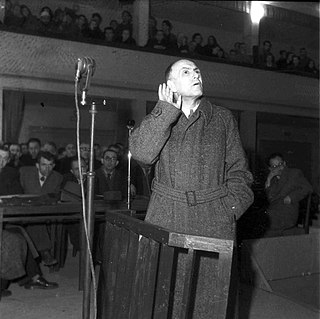 W
WThe Special Court for War Criminals and Enemies of the People, usually referred only as The Special Court, was a Socialist court set up during the spring of 1945 in the newly established Socialist Albania, which carried on the trial against those labeled as "people's enemies" and "war criminals". It was based on a decision taken by the Anti-Fascist Council of National Liberation on 25 December 1944. Like the rest of the Eastern Europe, the purge against "Fascists" and "war criminals" became a central part of the construction of society based on the Soviet model.